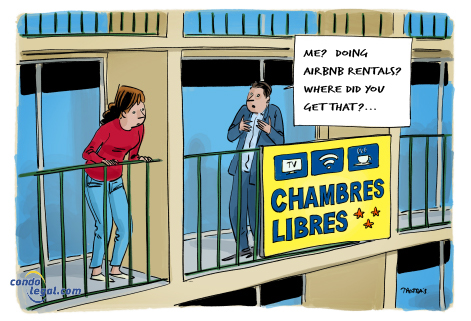
Many websites today promote residential housing exchanges between owners, offering an attractive solution to maximize the use of one's property. Whether you are considering a reciprocal exchange with another owner or an exchange based on "hospitality points"—referred to as "GuestPoints" on some online platforms—it is essential to consider several legal aspects.
Exchanging a residential property within a reciprocal framework is generally not considered a commercial activity, as long as certain rules are respected. Naturally, it all depends on the terms outlined in the declaration of co-ownership. However, a distinction must be made between the two most common types of exchanges, as their legal implications may differ. These options are detailed below
Reciprocal exchange without compensation
The temporary exchange of units between owners without financial compensation constitutes a gratuitous title and is considered a loan for use under article 2313 of the Civil Code of Quebec. This option appeals to co-owners looking to travel while reducing accommodation costs. However, certain precautions are necessary.
Article 1053 of the Civil Code of Quebec states that the purpose of the building is defined in the act constituting the co-ownership. If the building has a residential purpose, it is important to ensure that the housing exchange is not perceived as a commercial activity, which would contradict this purpose. Since a reciprocal exchange does not involve financial compensation, it is generally considered a loan for use and not a commercial activity.
2. Minimum occupancy period and occupancy authorizations
According to article 1054 of the Civil Code of Quebec, the use of private portions is regulated by the by-laws of immovable. It is therefore important to consult this section of the declaration of co-ownership to verify if a minimum occupancy period applies to temporary exchanges, such as, for example, three weeks. The declaration may also contain specific rules for temporary occupancy or unit exchanges, even if they primarily concern rentals. It is crucial to ensure that the exchange complies with the current rules.
3. Notification to the syndicate
Under article 1065 of the Civil Code of Quebec, the syndicate must be notified within 15 days following the agreement, with details such as the occupant's name, the duration of occupancy, and the date the by-laws of the immovable were provided to the occupant.
Exchange with hospitality points
In this arrangement, the exchange is not reciprocal. A co-owner (or a third party) stays in another person’s property and, instead of returning the favor by hosting the first person, offers Guest Points. These points, earned by hosting guests or through promotions, allow the host owner to enjoy a stay elsewhere later. This points-based system, relying on virtual compensation, makes apartment exchanges more flexible and is offered on specialized websites, enabling stays even without a direct exchange. While this is a practical solution, certain considerations must be taken into account:
Using hospitality points, though not a direct financial payment, is considered a commercial transaction because it involves virtual point compensation that enables access to other stays. In a strictly residential co-ownership, this practice violates the residential destination outlined in the act constituting the co-ownership. In fact, the exchange of stays via hospitality points introduces a commercial aspect, incompatible with the exclusively residential use of the building.
2. Minimum occupancy period
As with reciprocal exchanges, it is essential to adhere to the building’s bylaws, especially when the declaration of co-ownership prohibits any rental of less than one year. In this context, a short stay, even using hospitality points, would not comply with the rules, as it is considered temporary occupancy incompatible with the building's strictly residential purpose.
3. Regulations on occupancy authorizations
The declaration of co-ownership may contain specific rules on temporary occupancy, such as limiting the number of stays per year, governing guest hosting conditions, or restricting access to common areas for temporary occupants. It is therefore essential to carefully review these provisions to ensure that the exchange with hospitality points complies with the requirements.
4. Notification to the syndicate
It is important to comply with article 1065 of the Civil Code of Quebec, which requires notifying the syndicate within 15 days after an occupancy agreement, as this allows the syndicate to ensure that temporary residents are aware of and adhere to the building’s rules. For example, if a co-owner hosts a guest for a two-month stay in exchange for hospitality points, they must provide the syndicate with the occupant's name, the length of stay, and confirmation that this occupant has received a copy of the by-laws of the immovable. This step is important to avoid nuisances or misunderstandings and to ensure that the occupant respects the established lifestyle in the building, thus protecting the living environment for other co-owners.
Conclusion
To date, the jurisprudence has not, to our knowledge, addressed situations involving exchanges through platforms like HomeExchange. However, whether it is a reciprocal exchange or an exchange with hospitality points, it is essential to respect the destination of the immovable, occupancy period rules, and notification to the syndicate. The main difference lies in the nature of the exchange with hospitality points, which may raise questions about the presence of a commercial activity. Additionally, depending on the occupancy period of the unit, the exchange may also be prohibited by the by-laws of immovable.
Yves Joli-Coeur, Ad. E.
Lawyer
Dunton Rainville
3055 Boulevard Saint-Martin O
Bureau 610
Laval, QC H7T 0J3
Tél. : (450) 686-8683
Courriel : [email protected]
Chronic express the personal opinions of the author and in no way engage the responsibility of the site editor , CondoLegal.com Inc. The content and opinions expressed in a column are those of the author.



